- Home
- Lynne Olson
Those Angry Days Page 19
Those Angry Days Read online
Page 19
Lothian delighted in argument, and he enjoyed matching wits with anti-British senators like Hiram Johnson and Burton Wheeler. After dinner or lunch at the embassy, he was particularly fond of pointing out an oil painting of George III to Anglophobes and saying, “I hope you recognize the portrait of your last king.” As Wheeler-Bennett observed, “These sallies met with a mixed reception.”
PHILIP KERR FIRST CAME to public attention in the early 1900s, more than twenty-five years before he inherited his marquessate. At the age of twenty-three, he was a member of the famed “Milner Kindergarten,” a group of recent Oxford graduates recruited by Sir Alfred Milner, the colonial governor of South Africa, to help rebuild a country divided and ravaged by the Boer War.
The prime aim of these young civil servants was to persuade the war’s two antagonists—Boer and British settlers—that they must come together in mutual interest. The “kindergartners” helped draft a constitution that gave South Africa self-government within the British Commonwealth and restored the rights of the Boers. They worked to rebuild the country’s infrastructure and economy, reviving its railroads and reopening mines, ports, and schools. As liberal imperialists, they earned praise for saving “South Africa for the [British] Empire as a self-governing dominion, and almost certainly from a further civil war, with the willing acquiescence of the Boers,” the writer James Fox observed.
Less than a decade after this success, Kerr became personal secretary to Prime Minister David Lloyd George, acting as his principal foreign affairs adviser and, in Lloyd George’s words, “my constant companion and collaborator” for the last two years of World War I. At the Paris peace conference in 1919, the thirty-seven-year-old Kerr, serving as “Lloyd George’s other self,” helped write the most controversial passage in the Versailles Treaty—the clause that put sole blame on Germany for causing the war. That clause was the Allies’ justification for demanding huge reparations from Germany and became a flashpoint for German anger and resentment.
A high-minded idealist, Kerr became increasingly convinced that the Allies had made a terrible mistake, that the treaty had treated Germany unfairly and should be reversed. When Hitler came to power, he persuaded himself that the Führer, whom he described as “a visionary rather than a gangster,” was simply trying to correct the injustices of the treaty. Failing to understand the essential nature of the Nazis, Kerr, who by then had inherited his title, naïvely told a friend: “If only we can get into a conference with the Germans on the fundamental problems of today … we could influence them, I think, to moderate the brutality of their practice.”
Hitler and his associates skillfully exploited Lothian’s sense of guilt. They invited him to Berlin and trumpeted his pro-appeasement views; the German foreign minister Joachim von Ribbentrop called him “the most influential Englishman outside the government.” Jan Masaryk, the Czech minister to Britain, agreed, reporting to Prague in 1938 that Lothian was “the most dangerous” friend of Germany in England because he was “the most intelligent.”
Lothian’s pro-German attitude was reinforced by his intimate friendship with the equally appeasement-minded Nancy Astor, the wife of Viscount Astor and the first woman elected to the British House of Commons. The connection between the vivacious Nancy and the detached Philip was a perplexing one. “There isn’t any question that they were in love—and also that it was never consummated in any way,” one of Nancy’s sons told James Fox, who wrote a biography of Nancy and her sisters. Nancy herself reported to her sister Phyllis that Lothian would have bolted had there been any hint of sex.
The grandson of the duke of Norfolk, the lay head of the Catholic Church in Britain, Lothian had had a strict Catholic upbringing, was “distinctly pious” as a boy, and at one point had even considered becoming a priest. For all his charm and gregariousness, there was an ascetic, monastic side to him that discouraged the attentions of women. Romantic love, he once said, was a sickness that “troubles the heart and soul.”
While distinctly unconventional, the unmarried Lothian’s relationship with Lady Astor seemed to give him the solace and support he could find nowhere else. Plagued by religious doubts for years, he abandoned his Catholicism and, under her influence, converted to Christian Science. Even after he had changed his mind about Hitler and Germany, she remained his closest friend.
Lothian’s disillusionment with Germany was prompted by its seizure of Czechoslovakia in March 1939. Until then, he wrote an American friend, “it was possible to believe that Germany was only concerned with recovery of what might be called the normal rights of a great power, but it now seems clear that Hitler is in effect a fanatical gangster who will stop at nothing.” He decided that the Führer could only be halted through resistance by a coalition of Western democracies, with Britain and the United States at its head.
This was not a new concept for Lothian: throughout most of his adult life, he had committed himself to furthering Anglo-American cooperation as the foundation for world security and peace. As one of the young British advisers at the Paris conference, he had worked with his American counterparts to create the Council on Foreign Relations and the Royal Institute of International Affairs. He had continued his mission of fostering closer U.S.-British ties while serving as secretary of the Rhodes Trust.
The summer before he became ambassador, Lothian toured America to judge public opinion for himself and to make contacts with people who might help Britain in its struggle against the European dictators. “America really holds the key to the whole future,” he said at the time. In September 1939, soon after he arrived at the British embassy, he wrote to a friend in Britain: “Both winning the war and the prospects for a stable, free world afterwards depend ultimately on whether we win and keep the sympathy of 130 million Americans.”
Lothian knew what a ticklish task that would be. From the beginning, he made clear to his government that it must be very careful in its approaches to the Roosevelt administration and the American people. “We have never listened to the advice of foreigners. Nor will the Americans,” he wrote to Whitehall in early 1940. “They only differ in that we ignore such advice and the Americans get extremely angry when it is offered to them by any Briton.”
Lothian also insisted that the British must try to put themselves in Americans’ shoes, to make an effort to understand why they were so skittish about possible involvement in the war. In a memo to the Foreign Office, he argued that “there is generally as good a reason for Americans taking their view of international affairs as there is for our taking ours.” And in a letter to Nancy Astor, he observed: “We really have no ground to abuse the U.S.A. She is simply doing exactly what we did” in trying to stay clear of war.
The British approach to America, Lothian was convinced, must focus not on Britain’s desperate need for help but on the importance of his homeland’s survival for U.S. national security. “The United States, like all other nations,” he noted, “will only act when its own vital interests—which include its ideals—are menaced.” He was sure that at some point, Americans would understand how essential Britain was to their safety. But would that realization come in time to counter isolationist arguments and ward off British defeat? The ambassador knew what a narrow tightrope he must walk, speeding up Americans’ awareness of their country’s potential danger while concealing from them the fact that that awareness was a product of British propaganda.
Without official sanction from his government, Lothian set out to mount a sophisticated, under-the-radar publicity campaign to appeal directly to the American people. This operation was kept separate from the covert activities of William Stephenson’s British Security Coordination, which Lothian was informed of but with which he was not directly involved. In a cable to Lord Halifax, the British foreign secretary, the ambassador explained how important the views of ordinary Americans were: “To an extent unknown under the parliamentary system, it is public opinion as revealed in the press, the Gallup polls, the tornado of telegrams addressed to Congres
s” that proved to be the deciding factor in administration and congressional actions.
Throughout the early months of 1940, the ambassador made a series of speeches emphasizing the strategic interdependence of Britain and the United States, copies of which were widely distributed to U.S. opinion makers. Many major American newspapers ran front-page stories about his comments, which were also the subject of editorials and syndicated columns, most of them approving. Lothian’s growing popularity in the United States prompted scathing comments in the German press about the turncoat aristocrat. “The same Lord Lothian who, not so long since, was so reasonable and understanding, appears to have lost his head completely,” one paper snapped. “His utterances today appear simply unbelievable when compared with his past statements.”
In addition, Lothian recruited John Wheeler-Bennett to travel throughout the country as his “eyes and ears”—to sample public opinion, set up a network of contacts, and speak to local groups about the importance of British survival to America. For more than two years, the tall, mustachioed Wheeler-Bennett crisscrossed the United States, visiting thirty-seven states and lecturing to a wide assortment of organizations—women’s clubs, the Knights of Columbus, Lions, Kiwanis, Elks, Shriners, and Rotary. The elegant, erudite thirty-eight-year-old Briton often shared the program with other speakers, once finding himself “sandwiched between a dissertation on beekeeping and a fascinating discourse on how to deal with potato blight.”
In making the British case, Wheeler-Bennett was faced with a daunting challenge. Although he encountered nothing but kindness and hospitality in his travels, he found in his audiences “an unqualified determination to keep out of war by all possible means, and woe betide those who might be foolhardy enough to try to make [America] do otherwise.” Most Americans he met hated Hitler and his policies, but they were also wary of Britain and unsure it would survive. After the fall of France, Wheeler-Bennett recalled, “I found that it was I who had to sustain [Americans’] morale, for they had already written us off as defeated, albeit gallantly, and spoke to me in those hushed tones which are customarily used for the lately bereaved.”
To help counter such beliefs, Lothian ordered a quiet expansion of British press and publicity operations in New York. He put Wheeler-Bennett and Aubrey Morgan in charge of a new organization called the British Press Service, whose job was to “create an American appetite for knowledge of Britain, her capacity to wage war, the determination of her people to see it through, her desire that a better world should emerge from the struggle.”
The ambassador was adamant that in carrying out those objectives and in gathering intelligence about U.S. public opinion, British staffers must take extreme care to avoid attracting the attention of American isolationists and German operatives in the United States. He warned of “formidable, anti-British elements” which will “take every opportunity to misrepresent our motives and attack our methods.”*
To play to the sympathies and sentiment of the American people, Lothian urged his government to emphasize the heroic aspects of the rescue in late May 1940 of the British army at Dunkirk, particularly the hundreds of pleasure boats and other small craft owned by ordinary Britons that crossed the English Channel to help save British soldiers. British propaganda officials in London did so, and Americans were soon reading comments in their newspapers like this statement from The New York Times’s editorial page: “So long as the English tongue survives, the word Dunkirk will be spoken with reverence. For in that harbor … the rages and blemishes that have hidden the soul of democracy fell away. There, beaten but unconquered, in shining splendor [Britain] faced the enemy.”
The ambassador also encouraged Winston Churchill to make it clear that whatever happened in France, Britain would continue the fight against Germany. The two men were hardly friends: they had clashed over the years on several major policy issues, prominently including appeasement. At one point, Lothian wrote to a friend: “I think that Winston has made a fool of himself. He is always doing these things.” Churchill, in turn, considered Lothian to be a naïve, high-minded lightweight. But in the heat of war, each had come to appreciate the other. Lothian greatly admired Churchill’s courage and resolution, while the prime minister observed how, under the stress of crisis, Lothian had transformed himself into “an earnest, deeply stirred man … primed with every aspect and detail of the American attitude.”
Shortly after getting Lothian’s request, Churchill gave his famed “fight on the beaches” speech, which captivated the American people just as the ambassador had hoped. As a result of that address, and others like it, Winston Churchill became a hero in the United States. When Drew Middleton, an Associated Press reporter based in London, returned in mid-1940 for a visit to his boyhood home in South Orange, New Jersey, he found his family totally under Churchill’s spell. “What a great man!” an old uncle declared after listening to the prime minister’s latest speech on the radio. “What a great people!” other family members chimed in.
The drama of Dunkirk and the eloquence of Churchill helped convince many Americans that their country must give Britain all possible support in its lonely struggle against Germany. In one poll taken after the rescue and speech, more than 80 percent of Americans now favored sending as many arms as possible to the British. But even this signal of overwhelming public backing for military aid failed to budge the administration. A frustrated Lord Lothian wrote to an acquaintance in July: “There is universal admiration here for Winston and the spirit of the country, but as you will say, admiration and sympathy are not much good when one is fighting Hitler at the gate.”
The ambassador attempted to convince Roosevelt and Secretary of State Cordell Hull that they must take action now. With a German invasion of Britain apparently imminent, the situation was too perilous to indulge in further procrastination. By mid-July, the Luftwaffe had begun attacking British ship convoys in the Channel and targets on England’s southern coast. The Battle of Britain was about to begin, and as Churchill noted, “the whole fury and might of the enemy must very soon be turned on us.”
But Lothian’s arguments left Roosevelt and Hull unmoved. After his talks with the president and secretary of state, the ambassador informed the Foreign Office that the U.S. government “has not yet faced the fact that the only way in which it can save itself from being confronted by totalitarian navies and air forces three or four times as powerful as its own in the near future is by setting the situation in all its stark brutality in front of Congress without delaying.”
In his cable, however, Lothian chose to omit the political facts of life that had been explained to him by both Roosevelt and Hull. It was an election year, and although the president had not publicly announced it, he had recently decided to run for an unprecedented third term—a decision that he knew would be heavily criticized. Cautious at the best of times, he was determined not to give the Republican Party and his other isolationist foes any further ammunition for their charges that he was trying to lead the country into war.
With the president still on the sidelines, Lothian decided to go on the offensive himself. In a heavily publicized speech to Yale alumni, he warned the United States not to count on the British fleet’s availability to defend North America in the event of a British defeat. “I hope you are not building on that expectation,” he declared. “If you are … you have been building on an illusion.” In any event, the ambassador added, the Royal Navy would be far more effective in preventing enemy ships from entering the Atlantic from European waters than in trying to help patrol the vast Canadian and U.S. eastern coastline.
A few weeks later, when asked in a broadcast interview whether it was in America’s interest to help Britain, Lothian replied: “It is for you to decide what is in your own interest. But I should have thought that it was vital to you that Britain and the British Navy should stay in being until your own rearmament, your two-ocean navy, your fifty thousand airplanes and your big army were ready. Today we are your Maginot Line. If that goe
s, there is nothing left between Hitler and his allies and yourselves.”
But while Lothian’s voice was clearly being heard, he knew that his arguments would have far more impact if they were made by influential Americans. When a representative of the Century Group approached him in early July, he instantly recognized what a valuable resource these well-connected interventionists could be.
IN A TOUCH OF irony that Lothian couldn’t resist pointing out, his first meeting with a Century Group member, arranged by Aubrey Morgan, took place on July 4. The group’s emissary was the Reverend Henry Van Dusen, a prominent Protestant theologian who taught at New York’s Union Theological Seminary. After explaining to the ambassador how the Century Group came into being, Van Dusen asked what he and his friends could do to help the British. The answer was simple, Lothian replied—put pressure on the administration to send the World War I–era destroyers requested by Churchill. To help in that effort, he promised to supply the group with the latest confidential data on Britain’s defenses.
Not long afterward, he acquired a top-secret memo from Churchill stating that of the 176 destroyers with which Britain entered the war, only 68 were still fit for service in home waters—a point that underscored the gravity of Britain’s danger. Lothian leaked the memo to several members of the Century Group, as well as to other prominent interventionists. He asked that in their use of the material, they not provide the exact number of available ships, to lessen the chances of Britain’s foes discovering the source of the leak and also to reduce the strategic advantage that such information would give the Germans.

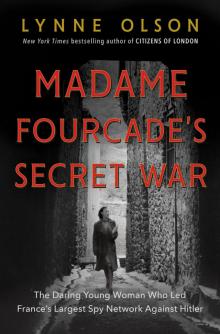 Madame Fourcade's Secret War
Madame Fourcade's Secret War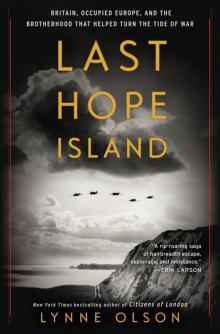 Last Hope Island
Last Hope Island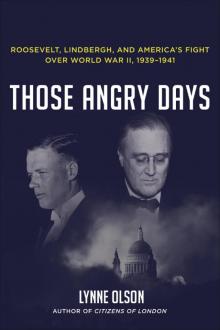 Those Angry Days
Those Angry Days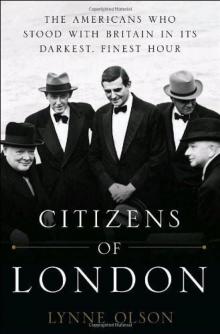 Citizens of London
Citizens of London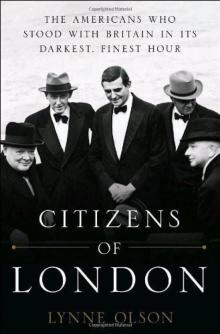 Citizens of London: The Americans Who Stood With Britain in Its Darkest, Finest Hour
Citizens of London: The Americans Who Stood With Britain in Its Darkest, Finest Hour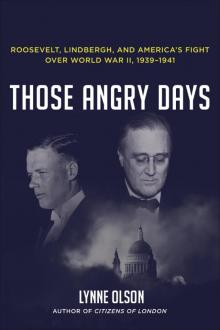 Those Angry Days: Roosevelt, Lindbergh, and America's Fight Over World War II, 1939-1941
Those Angry Days: Roosevelt, Lindbergh, and America's Fight Over World War II, 1939-1941